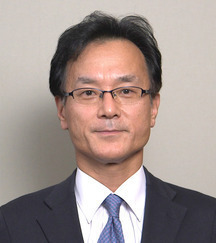Greeting
Greeting
ホーム > Greeting

Thank you for visiting the National Center for Geriatrics and Gerontology website. My name is Hidenori Arai, and I have been the Board President of this center since April 1, 2019 . The National Center for Geriatrics and Gerontology (NCGG) was established in 2004 as one of six national centers and became an independent administrative agency in 2010. Since this conversion, the NCGG has been arranged into several smaller sub-centers including the following: Center for Comprehensive Care and Research on Memory Disorders , Center for Development of Advanced Medicine for Dental Diseases, Center for Gerontology and Social Science, Center for Information on Geriatric Medicine , Innovation Center for Clinical Research (ICCR), Center for Training in Geriatric Medicine, Center of Assistive Robotics and Rehabilitation for Longevity and Good Health, Center for Development of Advanced Medicine for Dementia, and the Medical Genome Center, and has continued to develop activities in line with their mission. In 2015, the NCGG became the National Research and Development Agency and began to operate with further emphasis on R & D .
During this time, under the excellent leadership of President Emeritus Shinichi Oshima and former president Kenji Toba, the center has been developing human resources to take on the medical, nursing, and welfare needs of a super-aged society while providing medical care, which has become the standard for older adults and which includes advanced care for geriatric syndromes in Japan, such as dementia and frailty. Further, the NCGG has endeavored to develop the necessary public education activities while acting as a think tank for policies in several countries regarding the medical, nursing, and welfare needs of older adults. As a research center, the NCGG has striven to undertake various foundational studies on aging, clinical research, and epidemiological studies which aim for the realization of a society of longevity and good health. As the third board president, I intend to steadfastly continue with the roles the center has fulfilled thus far, and further, to strive for the center staff to work together, allowing us to become an international center on geriatrics and gerontology, open to the world. I would like to request guidance from all of you in this pursuit.
Our mission is to “promote the physical and mental health of older adults in order to build a society of healthy longevity.” Behind this mission is the fact that globally, Japan ranks first in longevity, with over 28% of the current population consisting of those aged 65 or above. In a super-aged society in which the only increase in numbers is that of older adults aged 75 or above, there needs to be a paradigm shift from the conventional “cure-seeking medical care” to “cure- and support-seeking medical care.” Within this treatment paradigm, the most important task is to handle dementia, which has become the main reason for requiring long-term care. Several organizations within the NCGG, including the centers for Development of Advanced Medicine for Dementia, Comprehensive Care and Research on Memory Disorders, Assistive Robotics and Rehabilitation for Longevity and Good Health, and the Medical Genome Center, have been mobilized for the prevention, diagnosis, treatment, and care of dementia and have experienced some success in their results. Further, to contribute to community development, we have started collaborating with Aichi Prefecture on the Orange Town Plan. Together, we have a vision for rebuilding the old ward, after 50 years, into the Orange Hospital, a core facility for “building a dementia-friendly community,” to integrate research and medical care, which will be the symbol of Orange Town. We will strive to practice appropriate care, dementia rehabilitation, and family classes promoted by the NCGG and return the results to the community and the public.
Frailty refers to a state in which, although able to lead an independent life, one is vulnerable to various stresses, due to changes in organ functions which accompany aging. This condition is a major obstacle to realizing a society of healthy longevity. With the Locomo-Frailty Center at the core, we hope to elucidate pathologies and establish treatment strategies for related conditions, such as sarcopenia and locomotive syndrome. Further, the active use of robots is imperative, and I plan to emphasize the role of the Center of Assistive Robotics and Rehabilitation for Longevity and Good Health. Through these research activities, I hope to participate in the development of new industries and contribute even a small amount to the longevity of our nation. Beyond these research and development pursuits, the NCGG will continue to improve our meticulous consultation and medical services for older adults more than ever. In these pursuits, I humbly request your continued advice and encouragement.
The National Center for Geriatrics and Gerontology, an Independent
Administrative Agency;
Hidenori Arai, President